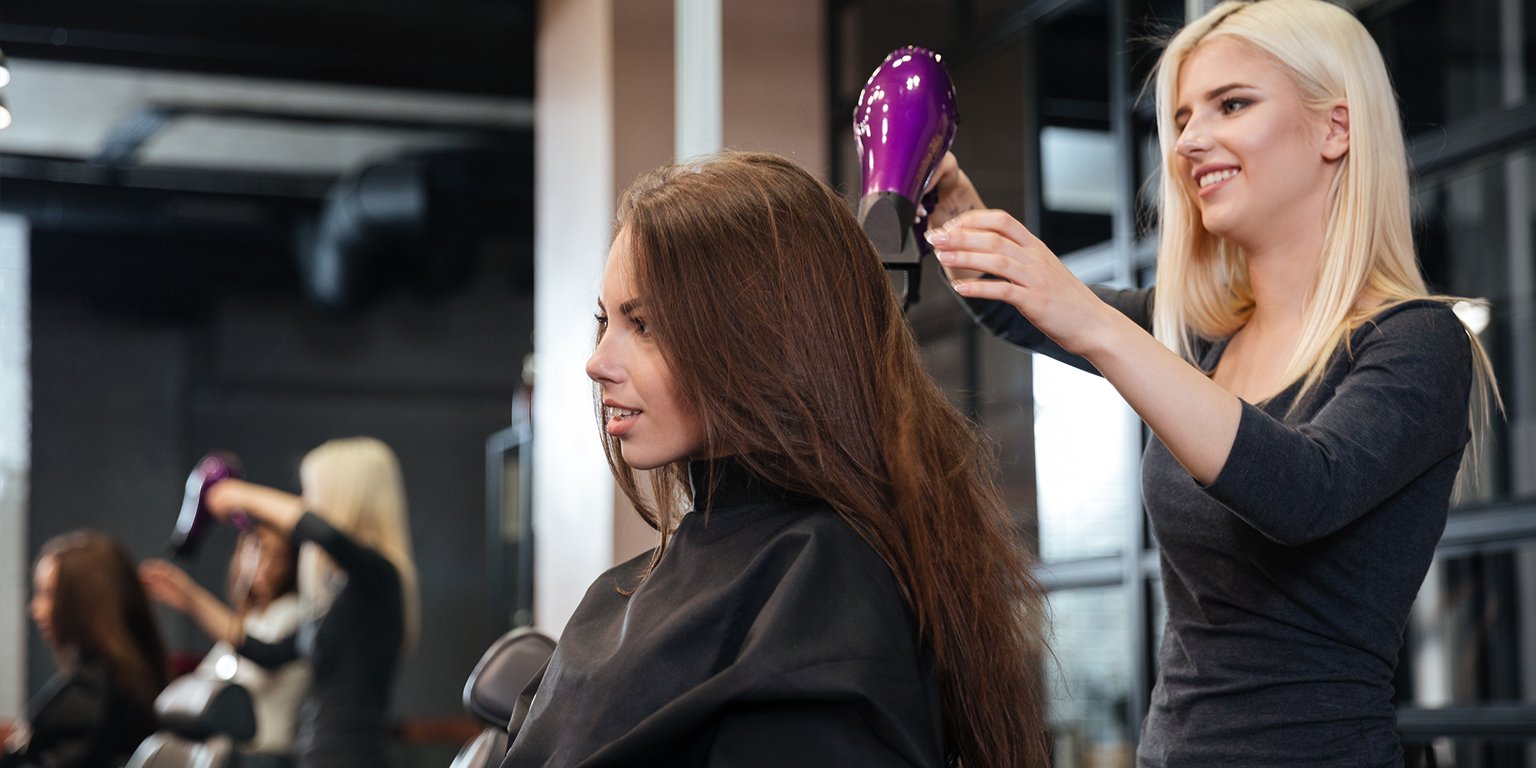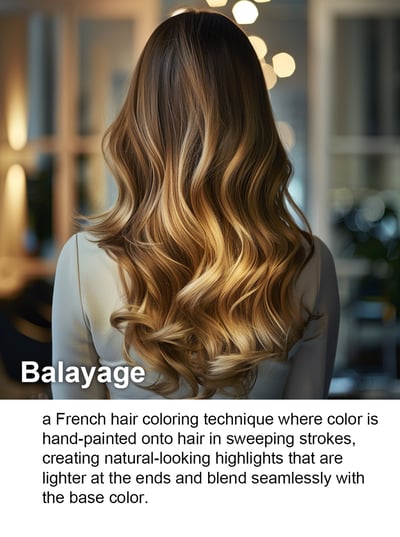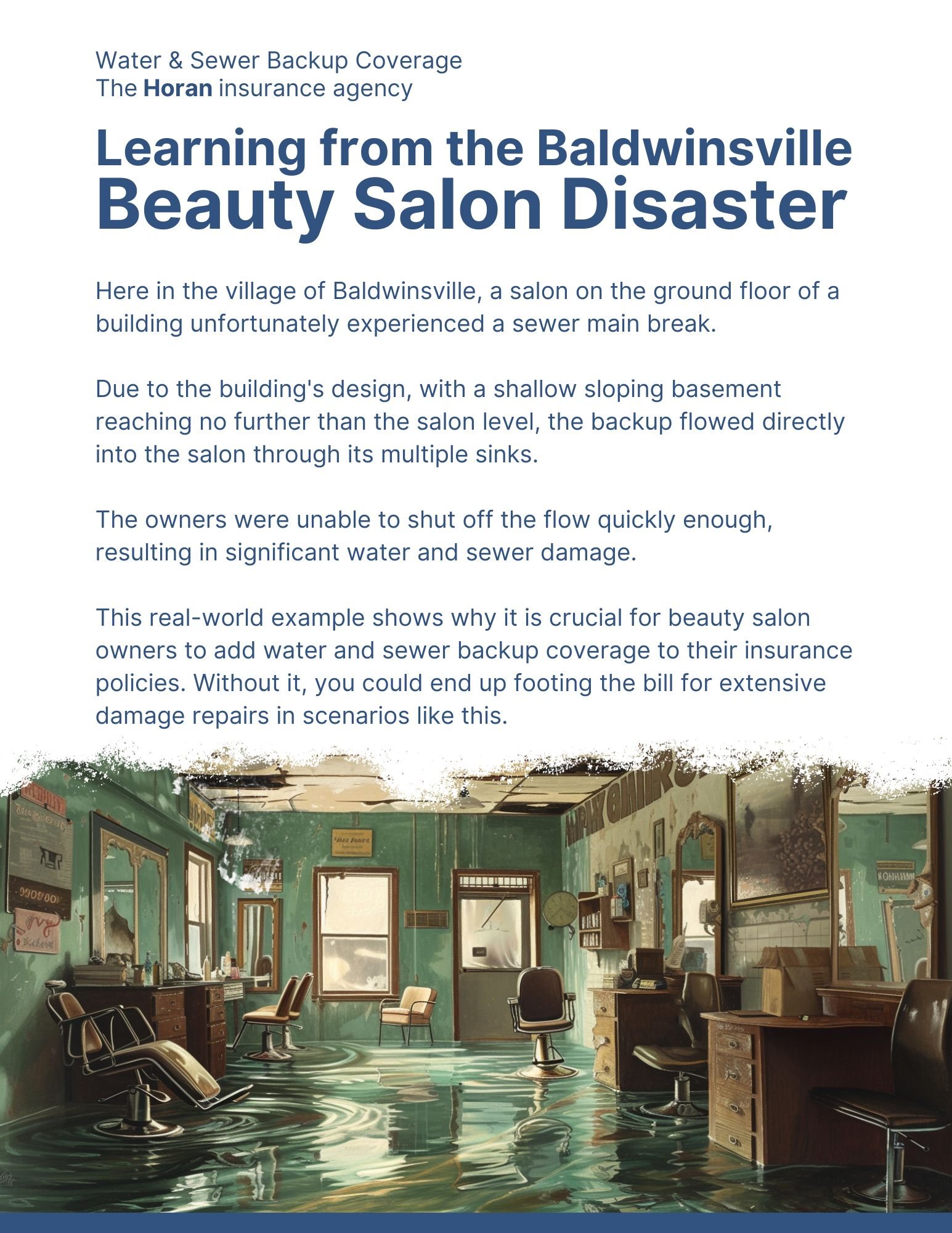What Insurance Do I Need for a Beauty Salon in Central New York?
April 3rd, 2024
6 min read

As a salon owner in Central New York, you pour your heart into crafting stunning looks and unforgettable experiences for clients. But the wrong insurance can derail your passion—putting your business at risk with steep costs or inadequate coverage.
The Horan insurance agency understands the unique challenges you face. We’ve been helping salon owners secure the right coverage since 2009. We can also guide you through the maze of policies, ensuring you have the right protection for your specialized services, assets, and employees.
In this article, we’ll explore essential coverages, address common risks, and empower you to confidently grow your salon without fear of the unexpected. To understand why proper insurance is so crucial, let’s start by examining the insurance landscape for salons in Central New York.
Navigating Insurance for Your CNY Salon
In the bustling beauty industry of Central New York, securing the right insurance for your salon is more than a mere formality—it’s a safeguard for your business’s future. Many salon owners find themselves navigating a maze of insurance options, often without clear guidance.
Consider this: standard beauty salon services like hair treatments, styling, and nail care typically meet insurance carriers’ approval without much fuss. It’s when you introduce esthetician services—think microdermabrasion, eyebrow waxing, or tanning—that the waters get murky.
These specialized offerings can complicate your insurance hunt, leading to steep premiums and stringent coverage terms. Insurance providers are cautious about procedures that alter the skin’s condition due to the potential risks.
However, rest assured, for every unique service, there’s a matching insurance carrier ready to take on the challenge.
The trick is to pinpoint the right insurance partner early on. This proactive approach ensures you’re not blindsided by unexpected costs or inadequate protection.
In the following sections, we’ll explore the essential insurance types your salon needs to operate with proper safeguards, ensuring every client leaves not just looking great, but feeling secure as well.
Selecting the Right Coverages for Specialized Salon Services
If you’re planning to offer or currently provide specialized services in your salon, be prepared for a more involved insurance acquisition process. Quick quotes and policy purchases within a few days are often unrealistic. When selecting coverages, it’s important to first understand the key policy types.
Insurance carriers are thorough—they’ll scrutinize your service menu, and if they spot offerings like eyebrow threading, they may reject your application outright unless you’re seeking a specialty product.
For traditional beauty salons, the path is clearer. You’ll need a Business Owners Policy (BOP) or a Commercial Package Policy (CPP) to protect your business assets—everything from sinks and chairs to mirrors and other equipment.
These policies cover property and general liability, but for salon-specific risks, you’ll want Professional Liability insurance. This coverage is crucial for incidents that fall beyond general liability, such as claims of professional negligence that could have a significant impact on someone’s well-being.
How a Business Owners Policy Works
A Business Owners Policy (BOP) is a package that combines various types of insurance coverage into one bundle designed for small to mid-sized businesses. It typically includes:
- Property Insurance: This covers the physical assets of your business from damage due to fire, theft, or other covered disasters.
- General Liability Insurance: This protects your business from financial loss should you be liable for property damage or personal and advertising injury caused by your services, business operations, or your employees. Salon owners should also ensure that chair renters carry their own liability insurance, listing the salon owner as an additional insured for added protection.
- Business Interruption Insurance: This compensates for lost income and helps pay for ongoing expenses if your business must close temporarily due to a covered loss.
A BOP is pre-packaged by an insurer, offering a convenient and often cost-effective way for business owners to secure essential coverage. It’s tailored to the common risks faced by small businesses and can be less flexible than a CPP.
How a Commercial Package Policy Works
A Commercial Package Policy (CPP), on the other hand, is more customizable. It allows business owners to select from a range of coverages and tailor their policy to fit the specific needs and risks of their business. While it can include the same types of coverage as a BOP, it can also offer additional protections that are not typically included in a BOP, such as:
- Equipment Breakdown Insurance: Covers the cost to repair or replace equipment damaged by mechanical breakdown, electrical arcing, etc.
- Professional Liability Insurance: Also known as Errors and Omissions (E&O) insurance, it protects professionals against claims of negligence or harm due to mistakes or failure to perform.
Professional Liability Insurance is particularly important for businesses that provide services or advice. It covers legal defense costs and any judgments or settlements that may result from lawsuits alleging negligence or errors in the services provided.
For example, if a salon’s hair treatment results in damaging a client’s hair or scalp, Professional Liability would cover the legal costs and any damages awarded, up to the policy limits.
Both a BOP and CPP can be customized, but the CPP offers a broader range of options for customization and additional coverage.
A BOP offers a convenient package of basic coverages, while a CPP provides a more flexible approach to building a policy that fits the unique needs of a business. Professional Liability is a critical coverage for service-oriented businesses, protecting against the financial consequences of professional errors.
It’s essential to secure the right coverage to protect against claims that could otherwise severely affect your business.
The Risks of Social Media in the Beauty Industry
Beyond the core risks of operating a salon, new exposures have emerged with the rise of online marketing and social media promotion. In this digital era, showcasing your salon’s work on social media is common practice.
A stunning balayage transformation can attract likes and potential clients when shared on platforms like Instagram. However, this seemingly harmless act of promotion carries its own risks.
 Imagine you’ve just completed a flawless balayage, and with your client’s beaming approval, you snap a photo to share online. Without proper consent, this could land you in hot water. If the client later disputes giving permission, you’re facing a potential breach of privacy.
Imagine you’ve just completed a flawless balayage, and with your client’s beaming approval, you snap a photo to share online. Without proper consent, this could land you in hot water. If the client later disputes giving permission, you’re facing a potential breach of privacy.
The situation becomes even more complex if the client has an order of protection. By tagging them and revealing their location, you inadvertently disclose their whereabouts, potentially to someone they’re avoiding. This is where advertising liability coverage becomes vital.
It protects against claims arising from such unintended consequences of your marketing efforts.
It’s essential to navigate social media with caution. Always obtain clear releases before posting client images, and be mindful of the information you share. With the right insurance in place, you can confidently promote your salon’s work, knowing you’re covered against the unforeseen pitfalls of online exposure.
In addition to coverages for your services, don’t overlook proper protection for your physical space.
Addressing Property and Employee Insurance in Your Salon
Water and Sewer Backup for Your CNY Salon
When it comes to safeguarding your beauty salon, Water and Sewer Backup coverage is essential for addressing water backup issues. This specific insurance coverage is designed to protect your business from the financial impact of water damage caused by backups in sewers or drains, which can be a common problem in salons due to the accumulation of hair and other debris.
Here’s how it typically works:
- Coverage Activation: The coverage kicks in when water backs up through sewers or drains, or overflows from a sump pump, causing damage to your property.
- Damage Assessment: An insurance adjuster will assess the extent of the damage caused by the water backup.
- Claim Process: You’ll file a claim with your insurance provider, detailing the damages incurred.
- Financial Protection: Depending on your policy limit, the insurance can cover the costs of cleaning up the water, repairing any damages to the salon’s interior, and replacing any ruined equipment or supplies.

It’s important to note that this coverage is not automatically included in all policies, so you may need to add it as an endorsement to your existing business insurance policy. Additionally, there may be limits to the coverage, so it’s advisable to discuss it with your insurance agent to ensure you have adequate protection for your salon.
By having Water and Sewer Backup coverage, you can rest assured that your beauty salon is better protected against the unique risks it faces, keeping your business running smoothly even in the face of unexpected water-related challenges.
Just as vital as insuring your salon itself is ensuring you have sufficient employee benefits in place.
Employee Benefits for Your Salon Workers
For salon owners who employ staff or rent out chairs to independent stylists, workers compensation and disability insurance are non-negotiable. Even if most of your staff are chair renters, the one receptionist on your payroll means you need workers comp to cover any potential workplace injuries.
It’s also wise for salon owners to require chair renters to carry their own insurance policies. These policies should list the salon owner as an additional insured, providing an extra layer of protection. This way, both the salon owner and the independent contractors are safeguarded against the unexpected, ensuring that everyone can focus on what they do best—making clients look and feel fabulous.
How Your Employee Benefits Work
For salon owners, understanding and obtaining the right insurance coverage is crucial for protecting both the business and its employees. Here’s a breakdown of workers compensation and short-term disability insurance:
Workers Compensation Insurance
- Purpose: Provides benefits to employees who suffer work-related injuries or illnesses.
- Coverage: Includes medical care, rehabilitation costs, and partial wage replacement.
- Requirement: Mandatory in New York State for businesses with employees.
- For Salon Owners: Even if you have independent contractors, having at least one employee typically requires you to carry workers comp insurance.
Short-Term Disability Insurance
- Purpose: Offers income replacement to employees who are temporarily unable to work due to a non-work-related illness or injury.
- Coverage: Typically pays a percentage of the employee’s regular income during the disability.
- Duration: Benefits usually last for a few weeks to several months.
Both types of insurance play a vital role in safeguarding the financial stability of the salon and its employees. Workers compensation covers work-related incidents, while short-term disability provides support for non-work-related health issues.
Protect Your Passion by Securing the Right Salon Insurance
Securing the right insurance safeguards your passion against unforeseen risks. We covered essential insurance tailored to your specialized offerings and employees.
Without this protection, an incident could devastate your business’s hard-earned success.
Horan has over a decade of experience guiding salons through this process, ensuring they operate with confidence. Don't jeopardize your dream. Work with experts who understand this industry’s intricacies. Your clients deserve stellar services, delivered without worry.
Click the Get a Quote button to take the first step toward safeguarding your Central New York salon with tailored insurance coverage that meets your unique risks.
Daniel is an accomplished content creator. He has been working in publishing for almost two decades. Horan Companies hired Daniel as its content manager in November 2022. The agency entrusted its messaging to him. Since then, Daniel has written insurance articles, service pages, PDF guides, and more. All in an effort to educate CNY readers. He's helping them understand the world of insurance so they can make informed decisions.
Topics:



























